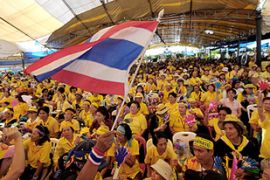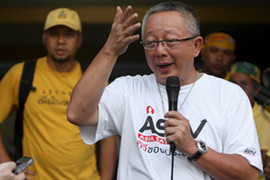Profile: Thailand’s PAD
Anti-government group a disparate collection of democrats and royalists backed by urban middle class.

Nobody knows who is really backing the PAD, but most analysts suspect the group has deep pockets and is connected to some powerful business and political figures.
The group says it is funded by public donations, but there have been suggestions its main backers are anti-Thaksin business interests.
Some have also suggested it is supported by the monarchy, but King Bhumibol Adulyadej has neither publicly backed nor condemned the group.
Certainly the PAD has a slick media and public relations operation, owning a radio station, a satellite TV channel as well as running a slick and popular online operation.
Democracy rollback
| Key facts: The PAD |
|
PAD led protests that triggered 2006 coup against the then PM, Thaksin Shinawatra.
Supporters wear yellow shirts, a colour associated with Thailand’s revered king.
Group accuses Thaksin supporters of pushing to turn Thailand into a republic, an allegation rejected by Thaksin.
Critics say PAD’s contempt for results of three democratic elections show it is neither popular nor democratic. |
Critics however have said the group’s name appears to be a misnomer as its opposition to the results of three elections show it is neither populist nor does it want representative democracy.
Instead, Sondhi and the PAD advocate the scrapping of the one-man-one-vote system in Thailand and say only 30 per cent of parliament’s members should be directly elected by the people.
The remaining 70 per cent should be chosen from various occupations and professions and be appointed, they say.
Similar ideas have been floated before, most notably in 1983.
The general who was then serving as prime minister, Prem Tinsulanoda, now an adviser to the king, found himself frustrated by having to compromise with the elected politicians in his cabinet.
Sondhi has said that the PAD hopes to “teach the politicians a lesson that just because they have the majority vote, doesn’t mean they can do whatever they want”.
Supinya Klangnarong from the Campaign for Popular Media Reform, a Bangkok-based lobby group, told Al Jazeera that the PAD was going against democratic principles.
“It is obvious now that the PAD proposal is very anti-democratic because they no longer believe in the politicians who are elected by the people,” she said.
Sondhi, who has also argued for an expanded role for the military, was largely responsible for instigating similar street protests in 2006 against Thaksin Shinawatra, the then prime minister.
 |
| PAD founder Sondhi Limthongkul is a media magnate and ex-Thaksin associate [EPA] |
Thaksin’s empowerment of the poor rural majority by implementing welfare programmes such as a universal healthcare scheme and cheap credit sparked fears in the country’s elite that the wealth gap that gave them their lives of privilege could evaporate.
So his elitist, royalist opponents exploited Thaksin’s weaknesses: corruption, heavy-handedness in dealing with alleged drug lords, accusations of manipulating the media and rumours of plans to turn Thailand into a republic.
The 2006 PAD-led street protests eventually triggered the bloodless coup that overthrew Thaksin in favour of a military-backed government.
Last year, the PAD also led protests that culminated in court rulings that forced the resignations of successive prime ministers deemed to be Thaksin allies perpetuating his policies.
